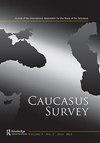边界封闭的内陆:亚美尼亚的出海问题
IF 0.4
Q3 AREA STUDIES
引用次数: 0
摘要
摘要封闭的边境对内陆经济体产生了巨大的不利影响,这些经济体已经面临着连通性方面的挑战。由于与土耳其的边境关闭,亚美尼亚发展有利过境路线和扩大市场准入的潜力有限。本文介绍了土耳其关闭边境的法律和政治概要。它审查了关闭对土耳其-亚美尼亚在区域一体化框架中的存在的影响,并说明了亚美尼亚现有过境选择的局限性。本文章由计算机程序翻译,如有差异,请以英文原文为准。
Landlocked with closed borders: Armenia’s problem of access to the sea
ABSTRACT Closed borders have enormously detrimental effects on landlocked economies which already face challenging constraints to connectivity. Due to the closed border with Turkey, Armenia has limited potential to develop favourable transit routes and to expand market access. This article presents a legal and political outline of the Turkish closure of the border. It examines the closure’s impact on the Turkish-Armenian presence in regional integration frameworks, and illustrates the limitations of Armenia’s available transit options.
求助全文
通过发布文献求助,成功后即可免费获取论文全文。
去求助
来源期刊

Caucasus Survey
Arts and Humanities-History
CiteScore
1.30
自引率
9.10%
发文量
4
期刊介绍:
Caucasus Survey is a new peer-reviewed, multidisciplinary and independent journal, concerned with the study of the Caucasus – the independent republics of Armenia, Azerbaijan and Georgia, de facto entities in the area and the North Caucasian republics and regions of the Russian Federation. Also covered are issues relating to the Republic of Kalmykia, Crimea, the Cossacks, Nogays, and Caucasian diasporas. Caucasus Survey aims to advance an area studies tradition in the humanities and social sciences about and from the Caucasus, connecting this tradition with core disciplinary concerns in the fields of history, political science, sociology, anthropology, cultural and religious studies, economics, political geography and demography, security, war and peace studies, and social psychology. Research enhancing understanding of the region’s conflicts and relations between the Russian Federation and the Caucasus, internationally and domestically with regard to the North Caucasus, features high in our concerns.
 求助内容:
求助内容: 应助结果提醒方式:
应助结果提醒方式:


